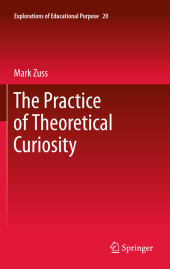 Neuerscheinungen 2013Stand: 2020-01-07 |
Schnellsuche
ISBN/Stichwort/Autor
|
Herderstraße 10
10625 Berlin
Tel.: 030 315 714 16
Fax 030 315 714 14
info@buchspektrum.de |

Mark Zuss
The Practice of Theoretical Curiosity
2012. 2013. xviii, 206 S. 6 Tabellen. 235 mm
Verlag/Jahr: SPRINGER NETHERLANDS; SPRINGER 2013
ISBN: 9400737602 (9400737602)
Neue ISBN: 978-9400737600 (9789400737600)
Preis und Lieferzeit: Bitte klicken
The Practice of Theoretical Curiosity advocates for a critical, aesthetic engagement in everyday life. Its purpose is to examine the pedagogical grounds and questions that motivate research programs in the sciences, education, technoculture and post-war social movements.
The desire for knowledge is an abiding facet of human experience and cultural development. This work documents curiosity as a sociohistorical force initiating research across the disciplines. Projects generated by theoretical curiosity are presented as historical and material practices emerging as expressions of embodied knowledge and experience. The shifting cultural, philosophical and practical relations between theory and curiosity are situated within classical, medieval, early modern and contemporary communities of practice. The Practice of Theoretical Curiosity advocates for a critical, aesthetic engagement in everyday life. Its purpose is to examine the pedagogical grounds and questions that motivate research programs in the sciences, education, technoculture and post-war social movements. Theoretical curiosity continually resists disciplinary limits. It is a core, embodied process uniting human pursuits of knowledge and power. This inquiry into inquiry itself offers an appreciation of the vital continuity between the senses, perception, and affect and concept development. It is informed by a critical reading of phenomenology as the embodied practice of researchers. This study sponsors a deepening of theory in practice and the practice of theoretical exploration. As a contribution to pedagogical practice, it offers a historical critique of the usually unquestioned philosophical, political and ethical grounds for educational, scientific and social research. The Practice of Theoretical Curiosity profiles significant alliances and persona as agents for the pursuit of novel and often controversial research, adventures and discovery. It claims that the place of technology and the technical is the primary channel for contemporary inquiry. The technosciences of genomics, artificial life and astrobiology are considered as contemporary extensions of a perennial desire to pursue and resist the limits of existing knowledge and representation.
Preface: Thinking Curiously.- Chapter One: First Questions.- Chapter Two: A Taming of the Passions.-Chapter Three: Pedagogies of Curiosity.- Chapter Four: The Sphinx.- Chapter Five: Curiosity and the Question.- Chapter Six: Technics: Thinking Life.- Chapter Seven: Minds, Limits, Spaces.


